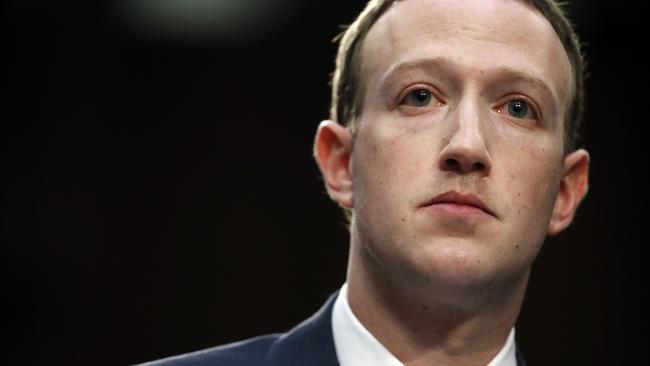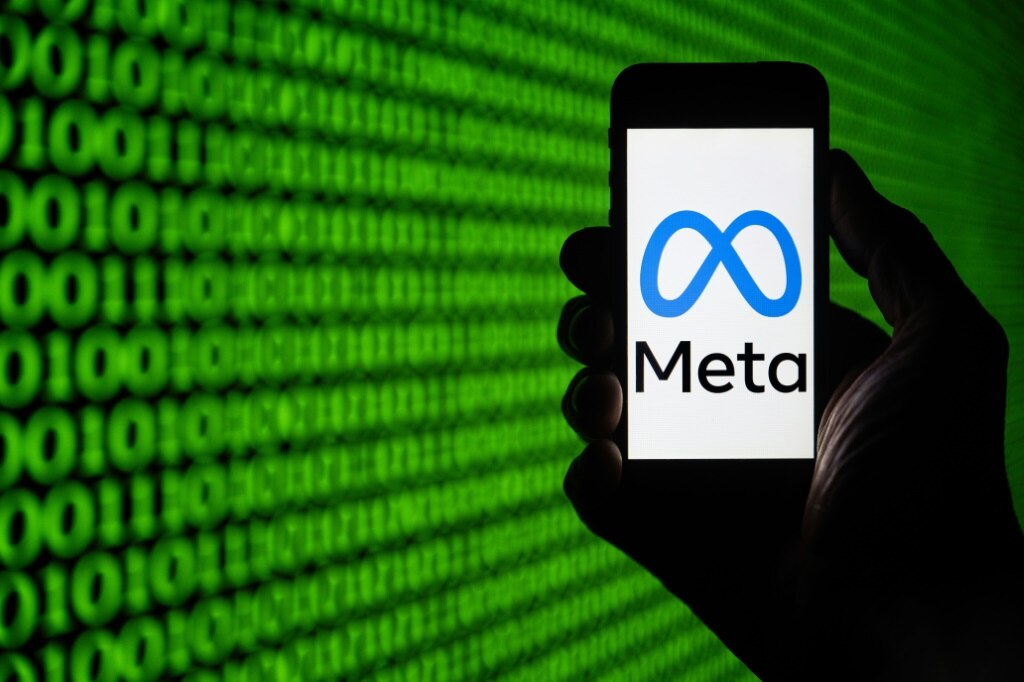Zuckerberg’s zeal for remaking the whole world
The Meta founder looks up to an ancient figure who ‘took a really harsh approach’ in order to achieve 200 years of relative utopia. Is that how Meta aims to entrench dominion over our lives?

The Super Bowl represents the pinnacle of many brands’ advertising calendars, with commercials costing $US14 million per minute to reach 115 million live viewers. But Meta’s contribution to the 2022 NFL championship game didn’t go down as planned.
The tech titan, whose apps (Facebook, WhatsApp, Instagram, Messenger and now Threads) reach nearly four billion users, aired its first Super Bowl ad since Facebook Inc became Meta Platforms Inc. The rebrand reoriented the firm around a future “metaverse” of individuals interacting in virtual worlds, elevating its blue-sky Reality Labs division focused on augmented reality, virtual reality and mixed-reality technology.
The ad opens in an ’80s arcade restaurant, where an animatronic band, led by a singing hound dog, performs Simple Minds’ Don’t You (Forget About Me). When the amusement centre shutters, the pooch is forced into retirement. He endures various travails – including being sold by a pawnbroker, used as a mini-golf course decoration and squashed inside a rubbish compactor – until he finds solace through the Meta Quest 2 headset, reuniting him virtually with his furry bandmates.
The ad seemed to peddle a dystopian ideology, with Meta’s response to social hardship being a metaverse “opiate for the masses” it controls. As Meta board member Marc Andreessen put it: “We are building online worlds that make life and work and love wonderful for everyone, no matter what level of reality deprivation they find themselves in.”
While the metaverse likely won’t be widely adopted beyond gaming soon, the rebrand seemed partly aimed at winning back Gen Zers, who were fast leaving Facebook for TikTok. But Meta’s Reality Labs segment, which has lost more than $US40bn, is a long-range bet. As chief executive Mark Zuckerberg wrote in his 2021 Founder’s Letter: “The metaverse is the next frontier in connecting people, just like social networking was when we got started.”
The February 2022 Super Bowl advert kicked off an annus horribilis for Meta, with three consecutive quarters of slowing revenue growth. And 25,000 pages of internal documents leaked to Wall Street Journal reporter Jeff Horwitz accelerated concerns about the pernicious mental health impacts of Meta’s services and Facebook’s role in fostering demagoguery and misinformation – impacts Meta long knew much more about than it let on. One poll found 72 per cent of Americans distrusted Facebook.
Apple’s 2021 App Tracking Transparency feature, requiring opt-in for cross-app data tracking, disrupted Meta’s ad microtargeting. With advertising well over 95 per cent of Meta’s revenue, Apple’s initiative contributed to a 41 per cent drop in Meta’s 2022 net income amid the cooling consumer spending environment.
But Meta’s stock soared fivefold since its November 2022 nadir. In February, Meta reported a 201 per cent jump in quarterly net income, after retrenching nearly one quarter of its employees during what Zuckerberg dubbed Meta’s “year of efficiency”. (The CEO’s private jet travel costs also more than halved from $US2.28m in 2022.)
However, efficiency alone can’t explain Meta’s turnaround. Last month’s all-time-high stock reflected its relentless – but high-risk – ongoing pursuit of scale over safety.
The psychology of “Zuck”, as his Instagram handle styles him, is key to understanding why mounting concerns about Meta’s social and political impacts are no brake on its ambition.

Veteran tech commentator Kara Swisher recalls first meeting the founder in 2006, two years after Facebook launched. “Unlike the perpetually intriguing Steve Jobs, Zuckerberg had almost no charm or game and it was painful how socially awkward he was then. He hemmed, he hawed, he looked everywhere but into your eyes,” writes Swisher in her new memoir Burn Book. “In contrast to the shark babies who tried to feign cuddly, Zuckerberg openly craved power and historical significance from the get-go.”
The edges of his public personality have since smoothed somewhat, just as mixed martial arts and CrossFit practice have physically transformed the one-time storybook pallid hooded techie. But despite professionalising – hiring spinners like former UK Liberal Democrats leader Nick Clegg – Meta has remained largely inured to public sentiment.
The company’s dual-class share structure means that despite owning less than 14 per cent of Meta shares, the CEO who once branded the bottom of every Facebook page “A Mark Zuckerberg Production” has voting control so is unfireable. Otherwise, his tin ear would have seen him out long ago. For years, he held out against banning posts containing Holocaust denial, once stating: “I don’t think they’re intentionally getting it wrong … it’s hard to impugn intent.”
In July 2021, he responded to President Joe Biden’s claim that Covid misinformation was “killing people” by equating Facebook to a city police department: “It’s a little bit like fighting crime in a city. No one expects that you’re ever going to fully solve crime.” The analogy proved particularly unfortunate given Facebook’s role in fomenting Trump’s stolen-election storyline and the subsequent US Capitol riot just six months prior.
In his recently released book Broken Code, Jeff Horwitz chronicles how Meta routinely sidelined recommendations from staff focused on social impact and “integrity” when tradeoffs involving growth arose. Their teams eventually fell under Meta’s marketing division. As controversies mounted, Meta’s ranks of top researchers swelled, yet the organisation frequently buried their inconvenient findings.
Horwitz reports allegations that Facebook once redesigned the abuse-reporting mechanisms, implemented by a “protect and care” team, to reduce the volume of user reports. It deliberately made reporting violations so cumbersome that some users gave up, presenting a confusing interface that tricked others into submitting reports to be archived rather than reviewed.
Horwitz also reveals that millions of Meta’s most prominent users comprised a whitelisted “cross-check list” of VIPs whose posts were escalated for human review rather than automatically removed if flagged as contravening rules. Insiders say this led to widespread protection of “persistent violators” and “abusive accounts”.
In the fallout from the leaked revelations about Meta’s pernicious effect on girls’ emotional health, the company agreed in late 2021 to “pause” work on Instagram Kids – an initiative that has yet to resurface. Earlier this year, following 41 US states suing Meta for misleading the public about its platforms’ social impacts, it implemented default content filters for under-18s, blocking teens from self-harm, suicide, and eating disorder content.
Most evidence points not to Meta being malicious but rather in over its head in needing to wield power responsibly. Despite Meta’s confidence in its algorithms, Facebook in particular remains a cesspool for scammers, likely drawn to its increasingly older, wealthier and less digitally sophisticated user base. However, Meta continues to underweight public policy concerns.
Case in point: it recently rolled out a paid subscription and tipping offering for Instagram and Facebook creators, providing verification badges for a monthly fee. Yet unlike other creator subscription monetisation platforms like OnlyFans and Patreon, Meta allows child modelling or influencer accounts if managed by an adult.
Even as evidence grows of account owners engaging in sexually charged conversations about their children with members of often large adult male subscriber bases, Meta refuses to ban subscription functionality for minor-focused accounts, claiming that their monitoring efforts suffice.
Despite ongoing concerns about misinformation, toxic “filter bubbles” and AI-generated content flooding its feeds, Meta remains cavalier about public interest news as it secedes from reality into the metaverse. This week, it shut down Facebook’s News tab in Australia and the US as part of its global decision to cease making payments to news publishers.
Facebook is also “deprecating” its misinformation monitoring tool CrowdTangle, used by journalists and researchers to track content’s viral spread across social media. CrowdTangle will shutter in August, just three months before the US presidential election, with its replacement Meta Content Library tool available only to researchers and non-profits – not journalists.
Originally purchased to aid publishers in studying and replicating top-performing social content, CrowdTangle became a chronic headache for Meta’s leadership as journalists monitored the spread of conspiracy theories and partisan hoaxes on its platforms.
Meta’s move towards default end-to-end encryption for Facebook and Messenger calls and messages, currently rolling out in Australia, will not help efforts to rid the platform of sex traffickers, terrorists and other criminals, as all data will soon be indecipherable beyond the sender and receiver devices.
While the global initiative is an olive branch to privacy advocates, many victim advocacy groups and law enforcement operations are sharply questioning it. Australian Federal Police Commissioner Reece Kershaw recently warned the Parliamentary Joint Committee on Law Enforcement that encryption is “one of the biggest issues we’re going to face when it comes to committing cybercrime or online child exploitation (or) money laundering”.
These privacy-protective measures mean Meta must adopt a more proactive approach to safeguarding minors or face further ignominy.
Another key factor behind Meta’s remarkable rebound is the ingenious adaptation of its ad machinery to Apple’s privacy protections.
Other social platforms like Pinterest, Snap and X lack the resources that Meta is investing in machine learning to revive its ad targeting capabilities and overcome dependencies on third-party data. With Meta attracting approximately three-quarters of US ad spend on social networks, it also possesses superior data from advertiser campaigns to fuel these AI-driven models. Paradoxically, Apple’s ATT response to privacy concerns – a groundswell exacerbated by the 2018 Cambridge Analytica scandal when the Trump campaign consultants misused Facebook data – is reinforcing Meta’s dominance in social media advertising.
Meta’s evolving AI-driven ad tech tools sidestep the need to track user behaviour across platforms by driving “conversions” within its own ecosystem. This creates even more of a black box for advertisers, exacerbating the power asymmetry.
Increasingly, the decisions once made by marketing teams will come from Meta, with its platform using AI to power and optimise infinite creative and messaging varieties – but now with the tech titan determining what insights it shares with businesses about their audiences.
Meta rightly prides itself on once enabling a generation of “direct-to-consumer” niche product businesses by allowing brands to access micro-targeted audiences that were previously too costly to reach through traditional channels like print and TV. But while Meta is recapturing ad dollars lost since ATT, many of those surviving niche businesses are languishing, with broader brands focused on larger audiences now getting easier traction.
Indeed, “direct-to-consumer” was never truly unmediated – a go-between remained, as was apparent when rising social ad prices tanked many of these digital-native SMBs.
Recently, Meta teamed up with Amazon as part of its drive to encourage users to make purchases within its platform. This partnership enables Meta users to buy directly from Amazon adverts without navigating away from Instagram or Facebook if they link their accounts.

Meta surrendering control to an outside party about what gets shown on its feeds was hard to imagine before tracking user data on external websites became so fraught.
While Meta has significant user growth headroom as the developing world digitises, no hegemon is unassailable. Of the top 10 most valuable companies two decades ago, only Microsoft retains that status today. Winning hearts will remain crucial as Meta faces intensifying global regulatory scrutiny.
Under its new Digital Markets Act, the European Commission is probing Meta’s “consent or pay” model of charging Europeans for an ad-free experience without behaviour tracking – itself a recent ploy to outmanoeuvre tighter EU consent rules around data collection.
As mobile industry commentator Eric Benjamin Seufert has written: “The users most sensitive to privacy concerns are unlikely to be using Meta’s apps in the first place. It’s really a choice that had always been available to them: “Accept personalised ads as a product usage subsidy or stop using Meta’s apps altogether.”
In the US, Florida’s Governor Ron DeSantis has enacted legislation barring individuals under 14 from creating social media accounts, obliging platforms from 2025 to shut down accounts of suspected underage Floridian users.
Meta executives should be wary about dancing on TikTok’s grave if the US bans TikTok. The short-video app’s $US6bn ad revenue last year amounted to less than 5 per cent of Meta’s global advertising revenues, and such an unprecedented crackdown would be ominous for all social media platforms. Meta has less public goodwill to draw on than any US big tech firm if regulatory pressure around new products – or, most dramatically, calls to break it up – gather steam. Meanwhile, despite its early mover advantage in the XR (extended-reality) headset market, Meta now faces a challenger in Apple.
Following February’s Apple Vision Pro launch, Zuckerberg posted a video on YouTube articulating the Quest 3’s superiority, betraying that the iPhone maker’s entry has him spooked. “I don’t just think that Quest is the better value, I think Quest is the better product, period,” he said.
But the Vision Pro’s price tag (seven times that of the Quest) suggests Apple’s initial play is focused on a niche enthusiast or professional market, more about marking territory than immediately competing with Meta’s current XR product suite.
A key decision for Reality Labs in the coming years will be how closely to partner with Google and leverage Android’s vast smartphone app ecosystem to match Apple’s advantage with iOS – at the risk of ceding some software control, curbing Zuck’s ambition to own the primary XR platform. Still, if the smartphone duopoly is any guide, XR will likely become a two-horse race. Responding to Google’s overtures may prove necessary for Meta to contain the Apple threat.
Artificial intelligence has overshadowed the metaverse in recent investor communications. Zuckerberg has been personally emailing AI researchers at rival tech giants in an attempt to poach them, circumventing the company’s famously structured recruitment process. Yet his metaverse commitment remains undisputed, with $US1m-plus payments recently offered to stars like Tom Brady, Snoop Dogg, Charli D’Amelio and Mr Beast to license their likenesses for AI avatars.
The appeal of mass XR adoption – a time when people spend their current daily average of seven hours of internet-connected screen time interacting in virtual worlds – is clear. Meta has extensively researched brain-machine interfaces, with the ambition of having devices controlled by thoughts alone. This would give the organisation access to brain data and potentially the ability to serve adverts based on brain activity, not just conscious thoughts.
Zuckerberg’s zeal for remaking society explains his professed inspiration from Augustus Caesar, the ruler who transformed Ancient Rome into the Roman Empire. The Facebook founder, who honeymooned in Rome and named the second of three daughters August, once told The New Yorker: “Basically, through a really harsh approach, he established 200 years of world peace.”
Yet while Caesar employed military might, his reign earned public loyalty through political mastery and alliance-building. Here, Zuckerberg could do well to emulate his ancient muse. For while Meta has rejoined the trillion-dollar company club, in the public’s eyes it remains as mistrusted as ever.
“Move fast and break things” was Zuckerberg’s catchcry that became a motto for a generation of scrappy Silicon Valley disrupters. But as Meta entrenches its dominion over our digital lives, a quote attributed to Caesar better captures the deliberative caution it would be wise to heed: “Make haste slowly.”
Ben Naparstek is a growth adviser and former Amazon executive. He was previously editor of The Monthly and a senior editor at Nine Newspapers.





To join the conversation, please log in. Don't have an account? Register
Join the conversation, you are commenting as Logout